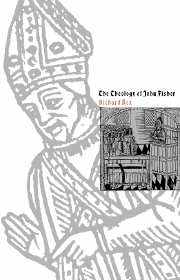Book contents
- Frontmatter
- Contents
- Acknowledgments
- List of abbreviations
- Introduction
- 1 Humanism and scholasticism in late fifteenth – century Cambridge
- 2 The preaching bishop
- 3 Fisher and the Christian humanists, 1500–1520
- 4 The Magdalene controversy
- 5 Fisher and the Catholic campaign against Luther
- 6 Authority
- 7 Faith, grace and justification
- 8 The eucharist
- 9 The inspiration and translation of scripture
- 10 The controversy over Henry VIII's first marriage
- 11 Conclusion
- Appendix John Fisher's library
- Notes
- Bibliography
- Index
9 - The inspiration and translation of scripture
Published online by Cambridge University Press: 04 November 2009
- Frontmatter
- Contents
- Acknowledgments
- List of abbreviations
- Introduction
- 1 Humanism and scholasticism in late fifteenth – century Cambridge
- 2 The preaching bishop
- 3 Fisher and the Christian humanists, 1500–1520
- 4 The Magdalene controversy
- 5 Fisher and the Catholic campaign against Luther
- 6 Authority
- 7 Faith, grace and justification
- 8 The eucharist
- 9 The inspiration and translation of scripture
- 10 The controversy over Henry VIII's first marriage
- 11 Conclusion
- Appendix John Fisher's library
- Notes
- Bibliography
- Index
Summary
In the course of the 1520s, Fisher's interest in what we now call Christian humanism was overshadowed by his zeal in defending orthodoxy against the Protestant Reformers. His humanism has therefore been hidden from the eyes of historians, and it would be tempting to presume that it was no longer there at all. The committed defence of traditional Catholic doctrine inevitably engaged him more closely with the teachings of the scholastics, although it is in fact remarkable how in his polemical writings he strove to go beyond them to the pre-scholastics and the fathers. Later in the 1520s, however, the Christian humanist in Fisher re-emerged in a controversy which has not merely been neglected by previous historians, but has remained completely unknown to them. The protagonist in this affair was a friend of his, the talented humanist and diplomat Richard Pace, dean of St Paul's. The issue at stake was the status of the Septuagint version of the Old Testament which, according to Pace, was a purely human artefact. However, to Fisher, it was itself, like the original Hebrew Old Testament, the product of immediate divine inspiration. Each party could call on a tradition of respectable antiquity in support of their view – the same issue had been debated between Jerome and Augustine. Moreover, Pace's view enjoyed considerable contemporary vogue, upheld not only by his and Fisher's tutor in Hebrew, Robert Wakefield, but also by Fisher's friends Erasmus and Reuchlin. It is at first sight surprising that Fisher should have taken exception to an opinion with such a pedigree.
- Type
- Chapter
- Information
- The Theology of John Fisher , pp. 148 - 161Publisher: Cambridge University PressPrint publication year: 1991
- 1
- Cited by



